The Last Domino Falls in the Sahel
Is Niger's Coup the End of French and American Presence in West Africa?
“It is evident that many more princes have lost their lives and their states through conspiracies than through open warfare, because being able to wage open war against a prince is within the reach of very few, while the possibility of conspiring against him is open to everyone.” - Machiavelli [Discourses, III.6]
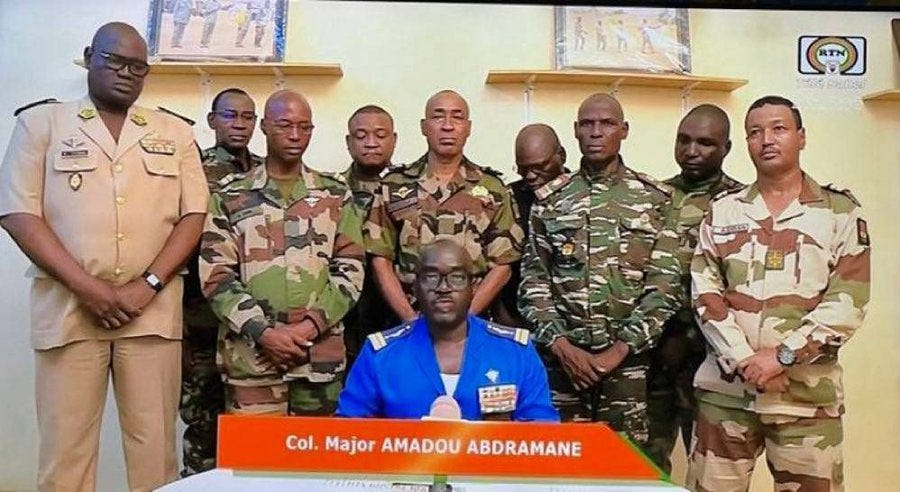
On Wednesday, July 26th, the Palace Guards in the African nation of Niger detained the President, Mohamed Bazoum. After some hours of confusion and protests from his supporters, the world witnessed a now-familiar sight: a group of African military officers, this time calling themselves the “National Council for Safeguard of the Homeland” [CNSP], on state television announcing an end to civil government. Acting as the junta’s spokesman, Colonel Major Amadou Abdramane cited the deteriorating security situation as well as poor economic and social governance as the reasons behind the coup. Mohamed Bazoum, whose location is unknown, has remained in communication with the outside world, from which he has received an outpouring of support. Unfortunately for him, it amounts to little more than “thoughts and prayers.” Niger, a former French colony and one of the world’s poorest countries, has become increasingly important to the French and American military presence in the Sahel region which has been rocked by a series of coups beginning in 2020. The military governments in neighboring Mali and Burkina Faso have expelled French troops, some of whom were relocated to Niger. At the same time, the United States has built an enormous drone base in Niger, which is key to its counter-terrorism strategy in the region.
Though there is not evidence of Russian involvement, it is widely considered that a military government could lead to the expulsion of French and American forces from the country and an increase in Russia influence, including the entry of the Wagner private military company into the country. It is still not entirely clear if the putschists will be able to hold power, but the rest of the military has opted to not fight the Palace Guards, so it seems that only some sort of dramatic and unlikely event could restore the civilian government. Further, it is nearly impossible to “isolate” Niger, as it is primarily surrounded by military and anti-Western governments who seem likely to recognize the new regime. It appears that the much maligned “Domino Theory,” once used to justify the US war in Vietnam, has come true in Africa: one could now easily drive across Africa from the Atlantic to the Red Sea, a distance roughly the same as the width of Russia, without ever entering into the territory of a civil government. It is not hyperbolic to say that, at least for now, this could spell the complete end of French and American presence in the region.
Niger lies near the center of Africa’s Sahel region, a narrow band of semi-arid land where the savanna transitions to the Sahara Desert. Like most Sahel countries, Niger’s population is concentrated in the more fertile south, with vast expanses of largely uninhabited desert constituting the majority of the country, though Niger’s large mining industry does support some population centers farther north in the country. The great majority of Niger’s population ekes out a living in agriculture, either through livestock production in the country’s semi-arid regions or farming the 12% of the country which is arable land. Niger is one of the world’s poorest countries, and also has the world’s highest fertility rate, an incredible 6.73 children per woman. Though the nation has suffered from colonialism and chronic political instability, it is also the case that Niger is a naturally poor land- arid and distant- and in the best circumstances would still struggle to attain prosperity. To Americans, ever ignorant of the outside world, the country is mostly known from having been warned against mispronouncing the name by “social studies” teachers in school. It is also known as a major source of high-grade uranium, something for which it received a lot of attention following the notorious “Niger yellowcake forgery,” a lie used to justify the invasion of Iraq. It needs to be noted that every nuclear power nation has multiple sources of uranium and while Niger is important, it only represents 5% of global uranium production. Further, as is usually the case, Niger wants to sell its uranium, and interested parties can simply pay for it without maintaining neo-colonial control over the country.
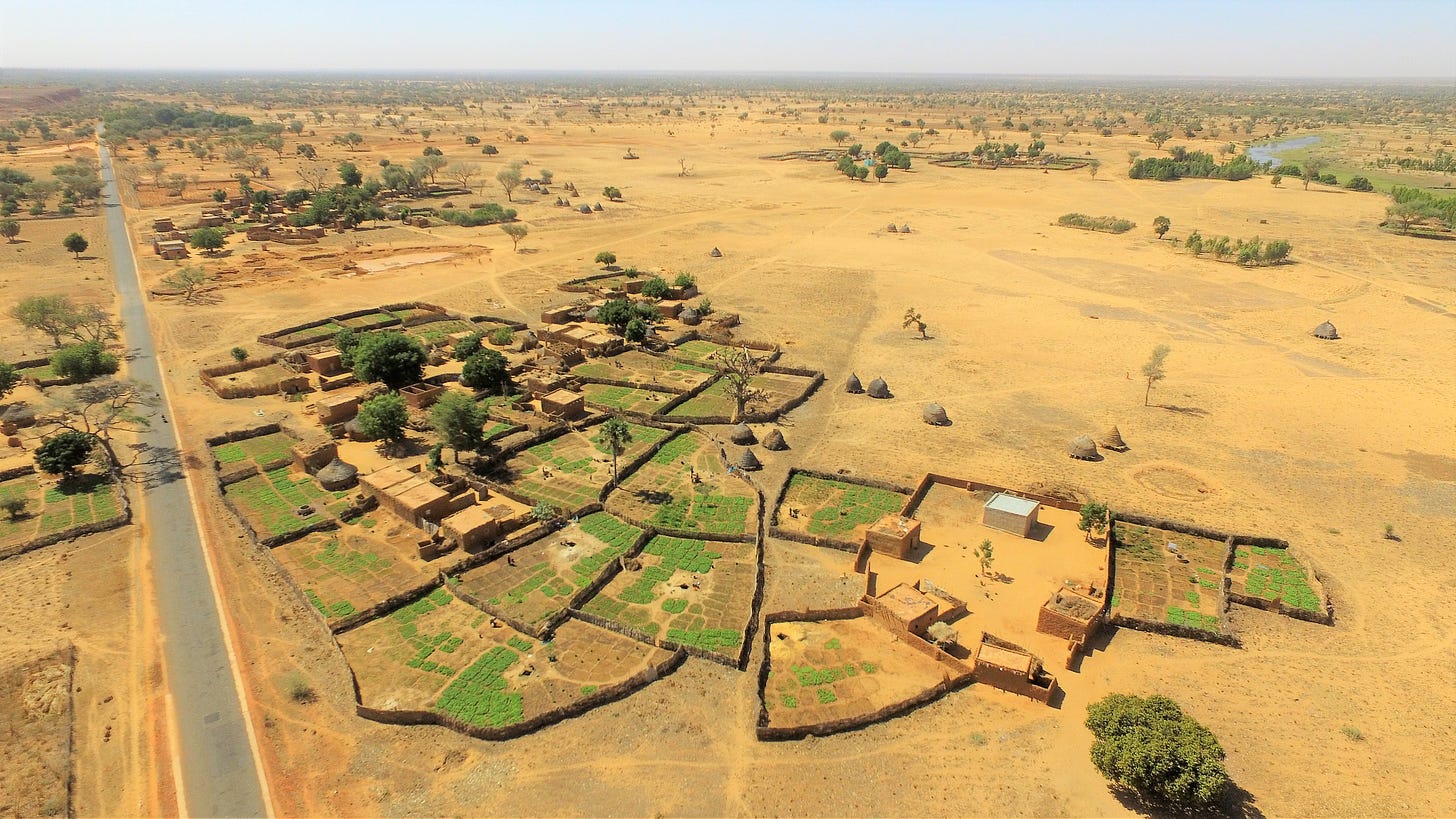
The Sahel region, which suffered greatly under colonialism, has been one of the world’s most troubled regions since the countries attained independence, primarily from France. Long known as the “coup belt,” by people who follow international relations, it has been living up to that name since 2020, with the region having experienced 6 coups in 11 months in 2021-2022. Besides systemic poverty and weak state institutions, the root of the problem has been an explosion of radical Islamic terrorism, triggered by the overthrow of Muammar Gaddafi in Libya in 2011 which led to tribal fighters from the Sahel returning home with their weapons and starting new rebellions. France has incessantly meddled in its former African empire, which they call Francafrique, usually to the harm of the region as well as France’s own interests; as of 2015 France had deployed its military to Africa over 50 times in the post-colonial era. I wrote an extensive background on the problems in Mali and Burkina Faso and how they related to the United States and France in February, and the same political and economic factors apply in Niger:
Until Wednesday, Niger had appeared to be a relative bright spot in the region despite serious economic and security challenges. Niger had been under elected leaders without any coups since 2011, when a coup overthrew the prior President and held new elections in which Mahamadou Issafou was elected. He was described as a “staunch Western ally” and Western involvement continued to build up throughout the course of his Presidency. Most notably, the United States built an enormous and expensive drone base starting in 2015 near the northern city of Agadez, in the heart of Niger’s mining region. Agadez is the largest US drone base on the continent and is key to American airpower in West Africa. The United States and France continued to draw closer to Niger throughout Issafou’s Presidency. At this point, the United States says it has spent over $500 million on security assistance to the country since 2012, and it is likely the case that the United States has also given “black budget” money to the country which we are not privy to.
In 2021, Issafou agreed to leave power, respecting term limits, and Mohamed Bazoum was elected in what was described as the country’s first peaceful and democratic transition of power since attaining independence in 1960. Bazoum, who belongs to a minority nomadic tribe of “Arabicized” Sudanese known as Awlad Suleiman, was encouraged to run by Issafou. Bazoum has continued Issafou’s pro-Western policies. Most importantly, following coups in other countries and increasing alignment with Russia, French troops were moved to Niger after being expelled from Mali in 2022 and Burkina Faso in 2023. Niger came to represent France’s last hope in the region.
The presence of foreign troops did little to improve Niger’s security, which should not come as a surprise since their failure at the same task led to the coups in Mali and Burkina Faso and the expulsion of French troops. In fact, Nick Turse, a journalist specializing in the United States’ role in Africa, reports that terrorist attacks in Africa have increased by an incredible 30,000% in the last 20 years since the United States began serious counter-terror operations on the continent. For one extreme example, the Agadez Airforce base has done so little to improve a security that a security contractor was robbed of a large amount of cash in broad daylight less than a mile from the base in late 2022. In a thorough piece of journalism for The Intercept earlier this year titled, “Drones and Motos: After Two Decades of U.S. Military Support, Terror Attacks Are Worse Than Ever in Niger” he explains that the jihadists on motorcycles have been on a looting rampage across the country’s populous south and the militaries- both foreign and domestic- have been powerless to stop it. The situation is in some ways particularly difficult in Niger as they face two insurgencies, the Islamic State and Al Qaeda who came in from Mali in the southwest as well Boko Haram who have moved into the southeast from Nigeria. Further, the terrorists are near the capital of Niamey, so the many civilians who have had to flee their rural homes to the city still do not feel safe in what are nominally government controlled areas.
Into this mess of poverty and violence, with the one bright spot being some sort of civil government, the Palace Guards seized the President on Wednesday, July 26th. While Bazoum remained “defiant” and governments around the world condemned the coup, he was firmly in their hands. Protestors came out in support of Bazoum, but were dispersed when Palace Guards fired guns into the air. The coup leaders announced the closure of land and air borders, a curfew, the end of political activities, and the end of the current regime. Despite this, they called coup supporters into the streets the next day, who turned out in large numbers, and went so far as to burn down the headquarters of Bazoum’s political party.
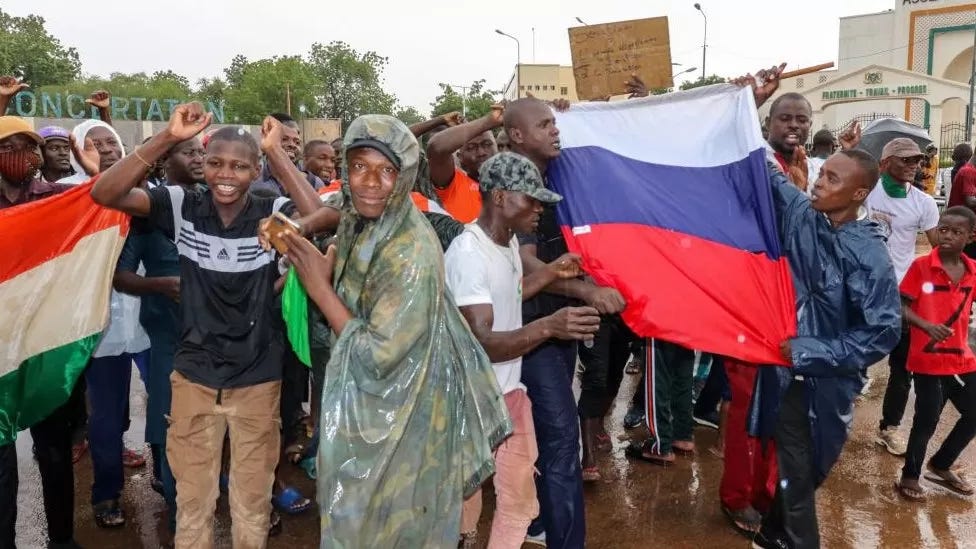
It had seemed for a time that other parts of the military might step in and restore Bazoum, but they ultimately pledged allegiance to the coup, saying none of this was worth shedding blood for. On Friday, the head of the Palace Guards, General Abdourahmane Tchiani declared himself the head of the coup government, citing insecurity, poverty, and corruption as the reasons for the coup. He further said the country would respect human rights and continue to honor international commitments, but threatened countries against interfering. However, while those were his claims, it has long been speculated that Bazoum was trying to fire him due to his advanced age, 62, and many believe the catalyst for the coup was simply that he didn’t want to be pushed into retirement.
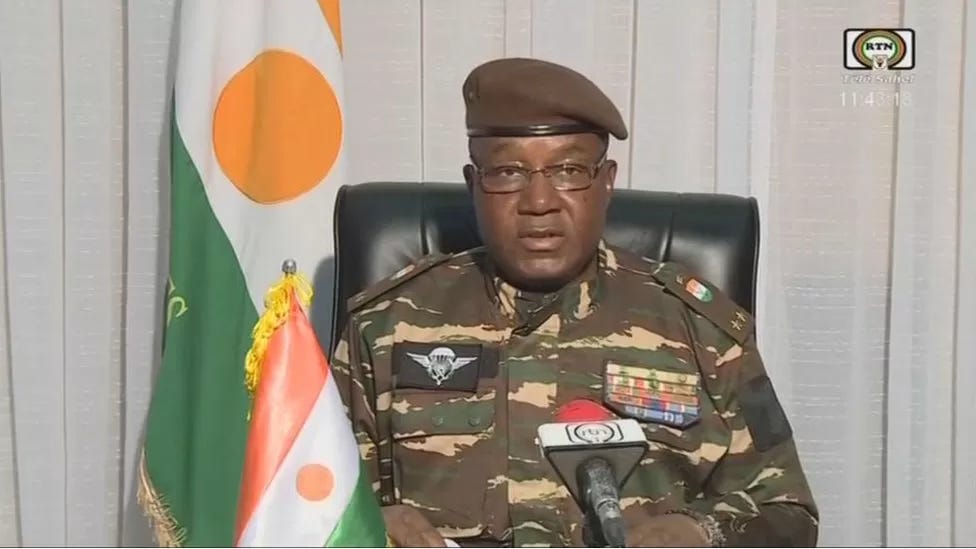
Either way, it seems as if the coup has succeeded. France’s Foreign Minister Catherine Colonna continues to insist that the coup is “not final.” The United States has been hesitant to call it a coup out of fear this would trigger laws which prohibit funding military governments. Meanwhile, Wagner chief Yevgeny Prigozhin, strangely out of trouble with Putin after his bizarre revolt, has praised the coup. The mercenary leader, surely dreaming of gold, posted this on the messaging app Telegram:
“What happened in Niger is nothing other than the struggle of the people of Niger with their colonizers. With colonizers who are trying to foist their rules of life on them and their conditions and keep them in the state that Africa was in hundreds of years ago.”
Reuters was unable to confirm the authenticity of the message, but this sort of cynical opportunism is very on brand for Prigozhin. The White House’s position is that it has seen no evidence Russia or Wagner was involved in the coup. This does not appear to have been a large plot with outside involvement from any party.
The question we are left with is why, despite the obvious peril, did the United States and France continue to increase their reliance on Niger? It was a sort of a mystery as to why this one country remained Western-aligned civil government, but it turns out it was only a matter of time. Really, the most basic pattern-noticing would have suggested a coup in Niger was coming, someone just had to decide to do it, though as ever, it is still a surprise when such things finally happen all at once. The clearest answer is that, as I’ve said before, our leadership class has no ideas that are not militarily attacking or buying off a problem, or sometimes scolding people to behave. Niger was the last country letting them do these things in response to terrorism in West Africa. Nathaniel Powell, one of the best researchers on Francafrique, explained the situation on Twitter, reaching a similar conclusion:
One argument, forwarded by many people including the above Alex Thurston over the prior years is that the United States and France were putting too much pressure on Niger as a counter-terrorism partner, which makes a lot of sense when you consider the country’s domestic problems and ultimately becoming the last remaining link in a chain which had already broken apart. Whatever happened, this again shows the drastic failure of US policies in the region, especially given that yet again at least some of the coup leaders were US trained. Most notably, a special forces commander named Brigadier General Moussa Salaou Barmou who is known to be a close US ally in Niger publicly gave support to the coup.
Those who don’t understand the dynamics of the region misunderstand this trend, as I explained on Twitter following Representative Matt Gaetz incredible interrogation of AFRICOM commander General Langley on this subject in March. It is easy to understand why someone would jump to the conclusion that these are thus US-backed coups, but in fact the opposite is true, and men they have trained go on to act against US interests. Others, who do understand the region, say that this is irrelevant, basically arguing that the US trains so many of these people it doesn’t demonstrate anything if a few go on to do coups. I would posit that it is both relevant to the broader situation if US policies are counterproductive to their goals, and that further, at the very least as a US taxpayer myself, it is relevant to me personally if my country’s money is being spent on projects that turn out in this fashion. It is typical of a ruling class which no longer wishes to engage us due to their own incompetence to believe they can achieve great things with a “curriculum” about “core values” and respecting civil government.
It remains too early to say what this will all mean for the Sahel region, but it seems that the policy of military support to civil governments there is most likely at a forced end. So far, the Nigerien putsch regime has made few of its policies clear. It is understandable, though, why some people in Africa place hope in military regimes, as when faced with constant violence and corruption it seems as if soldiers will be more honest and steadfast than politicians. Unfortunately, juntas are notoriously incompetent, and ultimately tend to respond to people pointing that out with brutality, a pattern that has played out under military governments across the world going back millennia. It appears that perhaps Tchiani, an older man who is familiar with palace intrigues, may do better than most, and is savvy enough to avoid antagonizing any outside powers immediately; it is notable that besides Sudan’s General Burhan, Tchiani is the only one of this wave of coup leaders to be an old man, with the rest in their 30s and 40s. If he plays this right, the US and France can make an exception for him on the grounds that it is the only option besides abandoning the Sahel to radical Islam. All his government would have to do is play nice with them and try to keep the more egregious human rights violations out of the news, and the global news media quickly loses interest in suffering in Africa. They did this in neighboring Chad, where the West accepted Mahamet Deby’s illegal seizure of power after his father’s battlefield death once he got French backing. It does seem that men of Tchiani’s generation, born around the time of independence, have not all moved past a post-Colonial mindset and are somewhat less hostile to the French than the leaders of the coup regimes to Niger’s west. At the same time, it’s undeniable that this could lead to the expulsion of US and French troops and leaves a potential opening for Russia and Wagner. However, Mali and Burkina Faso appear to be completely failing in their Russia-backed struggle against jihadists, and they have to pay Russia and Wagner, whereas the United States and France provide large amounts of financial assistance with various strings attached. It isn’t an easy decision to make, especially given as neither side’s assistance appears to work and to just give up fighting the jihadists is not an option either.
After 20 years of dismal American failure in Africa, there are few ideas left for solving these problems. For my part, I am not sure if this military regime is already proving itself genius or hilariously incompetent. It has been flooding the state television broadcast with the most unbelievable pro-military propaganda I have ever seen:
Mesmerizing. If I was Nigerien, being as nothing else has worked, I would honestly consider going along for a ride with the people who decided playing this on TV all day was a good idea. There is a certain delightful honesty to propaganda this over-the-top kitschy.
Niger’s coup is, as many have said, one of the less surprising political developments which could have happened. It was perhaps more surprising that civil government lasted 12 years without a coup. For the people of Niger, few things seem likely to make a difference. The odds are that they will remain impoverished, threatened by violence, and tugged at by outside forces beyond their control. Perhaps Tchiani is a great genius and we just don’t know it yet. Perhaps, a union of military governments will form stretching from Guinea to Sudan and this will allow them to defeat jihadists and resist the machinations of imperial powers. Perhaps the Sahara Desert will expand until it swallows them all. Perhaps they will learn to stop worrying and love radical Islam. One thing I can tell you is that the United States will not want to give up that drone base, even if it is unsupportable and largely useless deep behind enemy lines. The other thing I can tell you is that US-French involvement in the Sahel has been terrible for achieving US-French objectives and even worse for the people of the Sahel.
Indeed, Nick, Indeed.
Thank you for reading! The Wayward Rabbler is written by Brad Pearce. If you enjoyed this content please subscribe and share. My main articles will always be free but paid subscriptions help me a huge amount [West African CFA Francs preferred.] I have a tip jar at Ko-Fi where generous patrons can donate in $5 increments. Join my Telegram channel The Wayward Rabbler. My Facebook page is The Wayward Rabbler. You can see my shitposting and serious commentary on Twitter @WaywardRabbler.


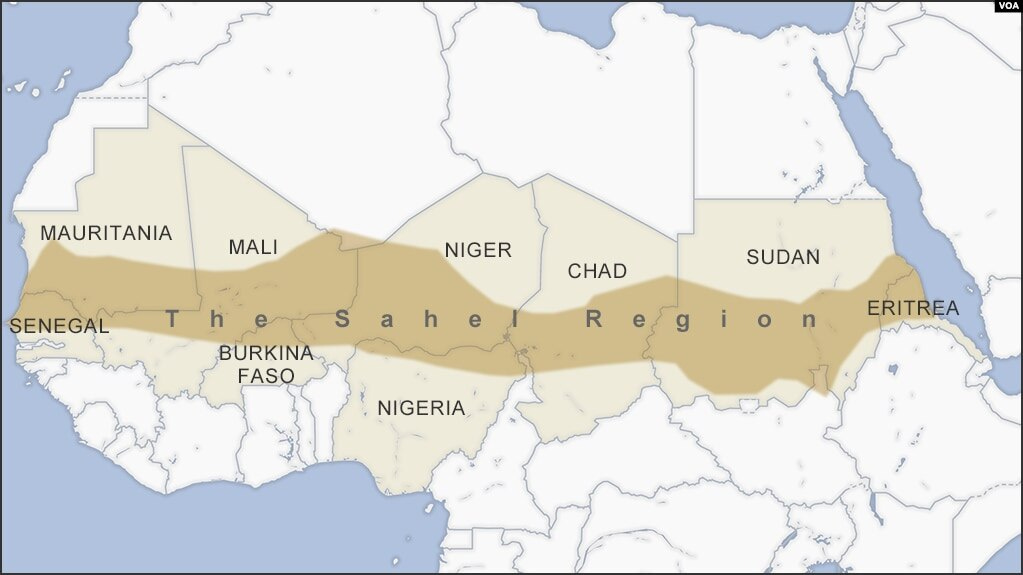
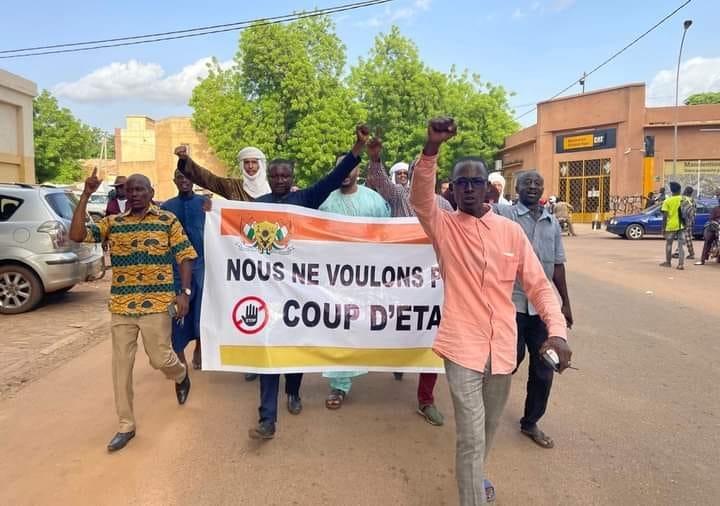
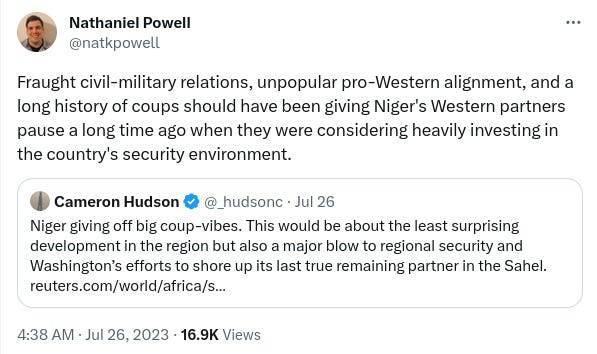



Now back to reality - a real Sahel policy : The Transaqua Project gains momentum :
https://larouchepub.com/eiw/public/2017/eirv44n37-20170915/31-35_4437.pdf
Contrast this with the US, French military meddling and the onslaught of ISIS - it is obvious to anyone with 2 brain cells Transaqua is the target to prevent African development, in other words colonialism.
Any serious Africa policy must build on this Transaqua initiative, put on the table by Italy in the 1970's.
This program is in the spirit of the US TVA and China's 3 Gorges Dam , and indeed China is involved in Transaqua. Africa is big - think big.